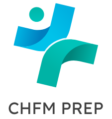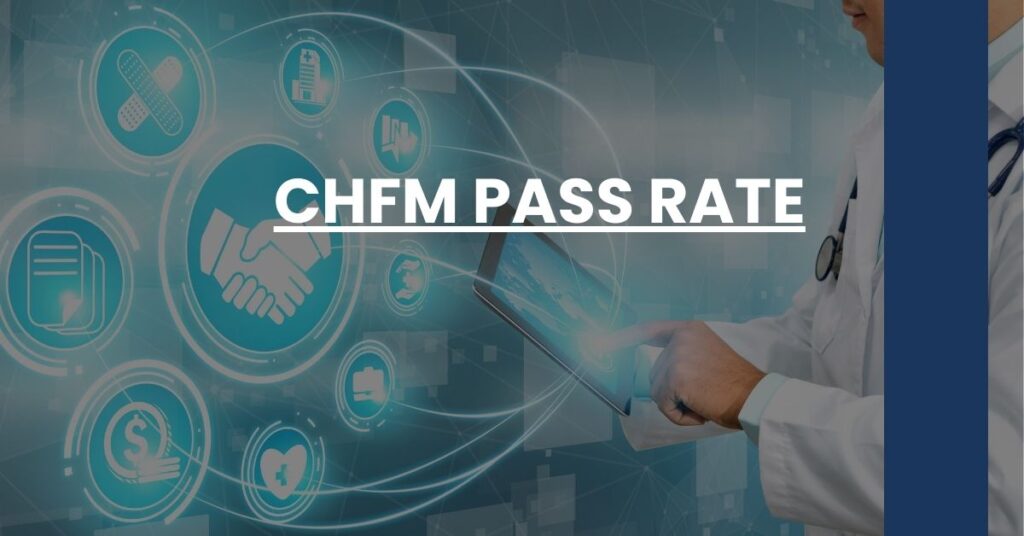The Certified Healthcare Facility Manager (CHFM) pass rate is a key metric indicating the success level candidates have on the exam—a reflection of both their expertise and preparation.
Prospective CHFM candidates often seek this information, aiming to gauge their chances and guide their study efforts. While specific pass rate figures are proprietary to the American Hospital Association (AHA) and not publicly disclosed, a general understanding suggests that candidates with comprehensive knowledge and diligent preparation can succeed.
Here’s what to expect in this article:
- Insights into how pass rates signal exam difficulty and preparation efficacy
- Strategies to enhance your odds of achieving a passing score on the CHFM exam
Feel confident as you aim for success on the CHFM—let this guide help elevate your preparation.
- Understanding the CHFM Certification
- The Importance of the CHFM Pass Rate
- Analyzing the CHFM Pass Rate Trends
- Factors Impacting the CHFM Pass Rate
- Preparation Tips to Improve Your CHFM Pass Rate
- Resources for CHFM Exam Preparation
- Navigate Exam Day: Maximizing Your CHFM Pass Rate
- After the CHFM Exam: Understanding Your Results
- The Role of the American Hospital Association (AHA) in CHFM Certification
- Frequently Asked Questions about the CHFM Exam
- Conclusion: The CHFM Pass Rate in Perspective
Understanding the CHFM Certification
When you’re aiming to cement your status as a leader in the healthcare facility management sector, achieving the Certified Healthcare Facility Manager (CHFM) certification can be a milestone. Regarded as a mark of distinction, the CHFM reflects comprehensive knowledge across critical domains such as compliance, planning, design, construction, maintenance, and administration in the healthcare setting.
As you explore this prestigious certification, it’s essential to understand that the CHFM is designed for professionals such as yourself, with responsibilities for maintaining a safe, functional, and compliant healthcare environment. In essence, this certification is tailored for facility managers, engineers, and maintenance supervisors in the healthcare industry, to name a few.
Entering the CHFM arena requires a foundational blend of academic credentials and on-the-job experience. Ideally, you’re expected to bring forth a bachelor’s degree and three years of experience in a healthcare facility management role or an equivalent combination of education and professional experience. When you set your sights on the CHFM, you’re committing to a career-long journey of professional growth and continuous learning.
Learn more about the CHFM Certification
The Importance of the CHFM Pass Rate
As you consider the challenge ahead, the CHFM pass rate is more than just a statistic—it’s an indicator of the exam’s rigor and the level of preparation required. A high pass rate can be reassuring, signaling that with the right resources and dedication, success is well within reach. Conversely, a modest pass rate is not a deterrent but a clarion call for meticulous preparation and determination.
The pass rate also serves as a benchmark against which you can set your expectations. While individual performance varies, understanding the CHFM pass rate offers a pragmatic glimpse into the level of difficulty other professionals like you have faced. This statistic is particularly insightful, not just from an academic standpoint but also as a reflection of how well the certification aligns with industry standards and practices.
Analyzing the CHFM Pass Rate Trends
Diving into historical CHFM pass rate data can yield valuable insights. While specific year-on-year statistics may not be at hand, broad trends can inform you about the evolving nature of the exam over time. For instance, if pass rates have consistently been on an upward trajectory, it could indicate an enhancement in the quality and accessibility of preparatory materials and resources.
However, should the pass rates display variability, this might suggest fluctuating exam difficulty or changes in the composition and experience levels of candidates. Unpacking these nuances is crucial as you gear up to join the ranks of certified healthcare facility managers, by understanding not just the final numbers but the underlying patterns that shape them.
Factors Impacting the CHFM Pass Rate
Several elements can influence the CHFM pass rate, each providing a lesson in how to shape your exam preparation strategy:
- Exam Breadth and Depth: The CHFM exam is comprehensive, testing a wide array of competencies required in healthcare facility management. The better you understand the scope of the content, the more adept you’ll be at tackling the diverse questions.
- Personal Experience: Your background plays a significant role. The depth of your professional experience can give you an edge, especially in areas where practical insight is invaluable.
- Study Material Effectiveness: The quality and relevancy of your study resources cannot be overstated. Sources like the ASHE CHFM Exam Review Course, the AHA CHFM Self-Assessment Exam, and targeted online courses such as DataChem Software’s can provide a structured and focused study regimen.
Remember, while these factors heavily influence the CHFM pass rate, your personal commitment to preparation is the true differentiator.
Discover helpful resources to improve your chances on the CHFM Exam
Preparation Tips to Improve Your CHFM Pass Rate
Embarking on your CHFM journey calls for strategic planning and disciplined execution. Here are preparation tips culled from a blend of expertise and practical wisdom to improve your success rate on the exam:
- Devise a Study Schedule: Time management is crucial. Allocate regular, uninterrupted study sessions leading up to the exam, ensuring all topics are covered comprehensively.
- Leverage Diverse Materials: Don’t rely on a single resource. Integrate different study tools such as textbooks, online courses, flashcards, and practice exams to deepen your understanding.
- Engage with Your Community: Connect with peers and mentors through forums, study groups, and professional networks. These connections can offer support, insights, and shared resources.
- Simulate the Test Environment: Practice full-length exams under timed conditions to acclimate yourself to the pressure and pace of the actual test.
- Stay Updated: Healthcare facility management is an evolving field. Keep abreast of the latest trends, technologies, and best practices through journals, webinars, and professional associations.
Remember, your meticulous preparation combined with a holistic understanding of the CHFM realm can significantly sway the pass rate in your favor. Your strategy should be a tailored blend of knowledge acquisition, practical application, and mental readiness.
Resources for CHFM Exam Preparation
To maximize your chance of sailing through the CHFM exam with flying colors, it’s essential to dive into the best study resources available. You’ll want to build a toolkit that not only comprehensively covers all domains of healthcare facility management but also aligns with your learning style and study habits.
Official Study Materials:
The American Hospital Association offers a range of materials specifically designed for CHFM exam candidates. Be sure to explore the Self-Assessment Exam (SAE), which mirrors the format and content of the certification exam, providing a realistic gauge of your readiness.
External Prep Courses:
There are numerous courses and study aids outside of the AHA that can reinforce your knowledge. The Mometrix Test Preparation platform, for instance, offers a detailed CHFM Study Guide along with flashcards, practice questions, and instructional videos specifically developed to hone your test-taking skills.
A multifaceted approach to preparation that includes a thorough review of the AHA’s official materials, complemented by third-party courses and tools, can broaden your understanding and solidify your recall, giving you that edge to boost your chfm pass rate probability.
Navigate Exam Day: Maximizing Your CHFM Pass Rate
The big day is here. Your preparation has prepared you for this moment, and it’s time to bring all your hard work to fruition. These are the strategies to ensure you’re at your best on exam day:
- Rest Well: A clear, rested mind is crucial. Ensure you get a good night’s sleep before the test.
- Eat Wisely: Choose a balanced meal for sustained energy. Avoid heavy, greasy foods that could make you sluggish.
- Arrive Early: Factor in extra time for travel to the testing center to avoid any rush and stress.
- Bring Necessary Items: Confirm that you have all required identification and materials before leaving home.
- Stay Composed: Keep your nerves in check. You’ve put in the effort, trust in your preparation.
Walking into the exam room with confidence and calm will help you think clearly and perform to the best of your ability. Every deliberate step you take on exam day is a step towards securing a passing score.
After the CHFM Exam: Understanding Your Results
The moment of truth arrives when the exam concludes, but what comes next? After you submit your answers, a period of patient waiting ensues before the results land in your hands.
Once delivered, your results will not only tell you whether you passed or failed, but will also give you a breakdown of your performance across different areas of the test. This feedback is vital, as it highlights your strong suits, as well as the domains where you may need to focus future study efforts.
If the outcome is not what you hoped for, don’t be disheartened. Take it as an opportunity to reassess your preparation strategies, improve upon your weaker areas, and come back stronger for the next attempt. Remember, the CHFM certification is a career investment—perseverance can pay large dividends in the long run.
The Role of the American Hospital Association (AHA) in CHFM Certification
The AHA doesn’t simply administer the CHFM exam; it’s the bastion upholding the certification’s prestige. By offering a thorough certification process, the AHA ensures that the CHFM remains a respected symbol of expertise within healthcare facility management.
From establishing eligibility criteria to setting exam standards and facilitating ongoing professional development, the AHA’s hands-on approach secures the CHFM’s position as a well-regarded marker of industry competence. Through this rigorous certification process, the AHA contributes significantly to the professionalization of healthcare facility management.
*Learn more about how the AHA maintains the integrity of the CHFM certification process at the AHA Certification Center.
Frequently Asked Questions about the CHFM Exam
Diving into the CHFM entails numerous questions, and it’s natural to seek answers. Here are a few commonly asked queries that can help demystify aspects of the exam:
- What is the chfm pass rate? – Exact pass rates are proprietary to the AHA and are not publicly disclosed. However, success is attainable with thorough preparation.
- How much time should I invest in studying? – This varies, but most candidates benefit from months of consistent study, allocating dedicated hours each week.
- Are there official prep courses? – Yes, the AHA provides exam resources, and third-party courses are also available.
- Is the CHFM worth it? – For many healthcare facility management professionals, the CHFM is a valuable credential that can open doors to career advancement.
With every question addressed, your vision of the journey to CHFM certification becomes clearer, paving the way for a focused and informed approach to your exam preparation.
Conclusion: The CHFM Pass Rate in Perspective
As we’ve traversed the landscape of the CHFM exam and certification, we’ve highlighted not just strategies and resources to bolster your chfm pass rate but also contextualized this endeavor within your broader professional journey.
The CHFM certification stands as a testament to your dedication and expertise in healthcare facility management. While the pass rate is a measure of success, your commitment to continuous learning and development is what truly defines your career trajectory.
Let the insights and guidelines covered here steer your preparation course—ensuring that when you next search for “chfm pass rate,” it’s not in search of odds but in pursuit of confirmation that your hard work has placed you among the ranks of Certified Healthcare Facility Managers.
Forge ahead with confidence, knowing that your quest for the CHFM certification is not just about passing an exam but about affirming your position as a leader in an ever-critical and evolving field.

